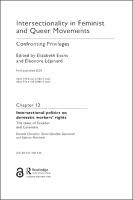Chapter 12 Intersectional politics on domestic workers’ rights
Proposal review
The cases of Ecuador and Colombia
Author(s)
Cherubini , Daniela
Garofalo Geymonat, Giulia
Marchetti, Sabrina
Language
EnglishAbstract
Examining the ways in which feminist and queer activists confront privilege through the use of intersectionality, this edited collection presents empirical case studies from around the world to consider how intersectionality has been taken up (or indeed contested) by activists in order to expose and resist privilege.The volume sets out three key ways in which intersectionality operates within feminist and queer movements: it is used as a collective identity, as a strategy for forming coalitions, and as a repertoire for inclusivity. The case studies presented in this book then evaluate the extent to which some, or all, of these types of intersectional activism are used to confront manifestations of privilege. Drawing upon a wide range of cases from across time and space, this volume explores the difficulties with which activists often grapple when it comes to translating the desire for intersectionality into a praxis which confronts privilege. Addressing inter-related and politically relevant questions concerning how we apply and theorise intersectionality in our studies of feminist and queer movements, this timely edited collection will be of interest to students and scholars from across the social sciences and humanities with an interest in gender and feminism, LGBT+ and queer studies, and social movement studies.
Keywords
feminist movement; intersectionality; queer movement; racial privilegePublisher
Taylor & FrancisPublisher website
https://taylorandfrancis.com/Publication date and place
2019Imprint
RoutledgeClassification
Feminism and feminist theory
Gender studies, gender groups
Sociology


 Download
Download